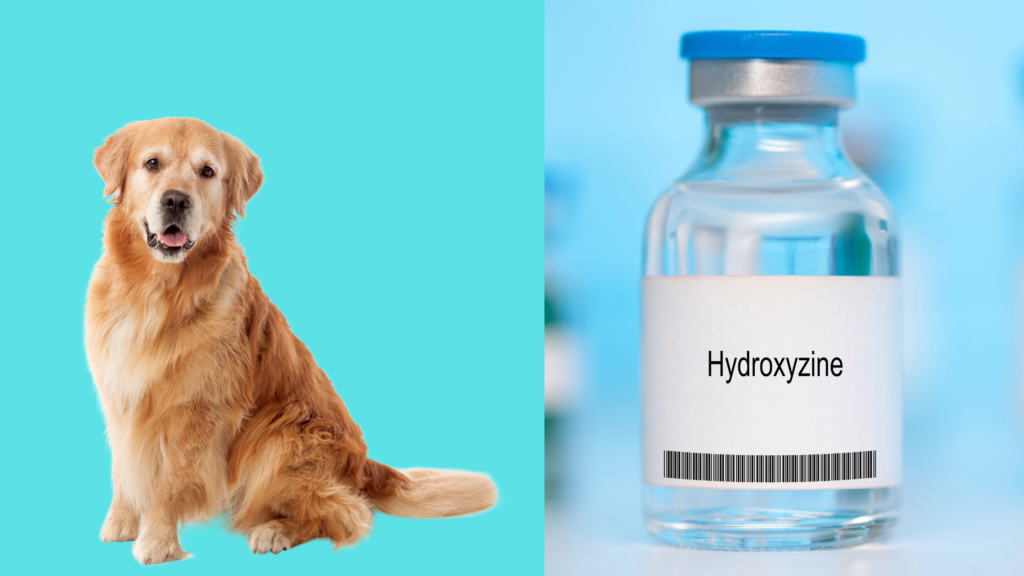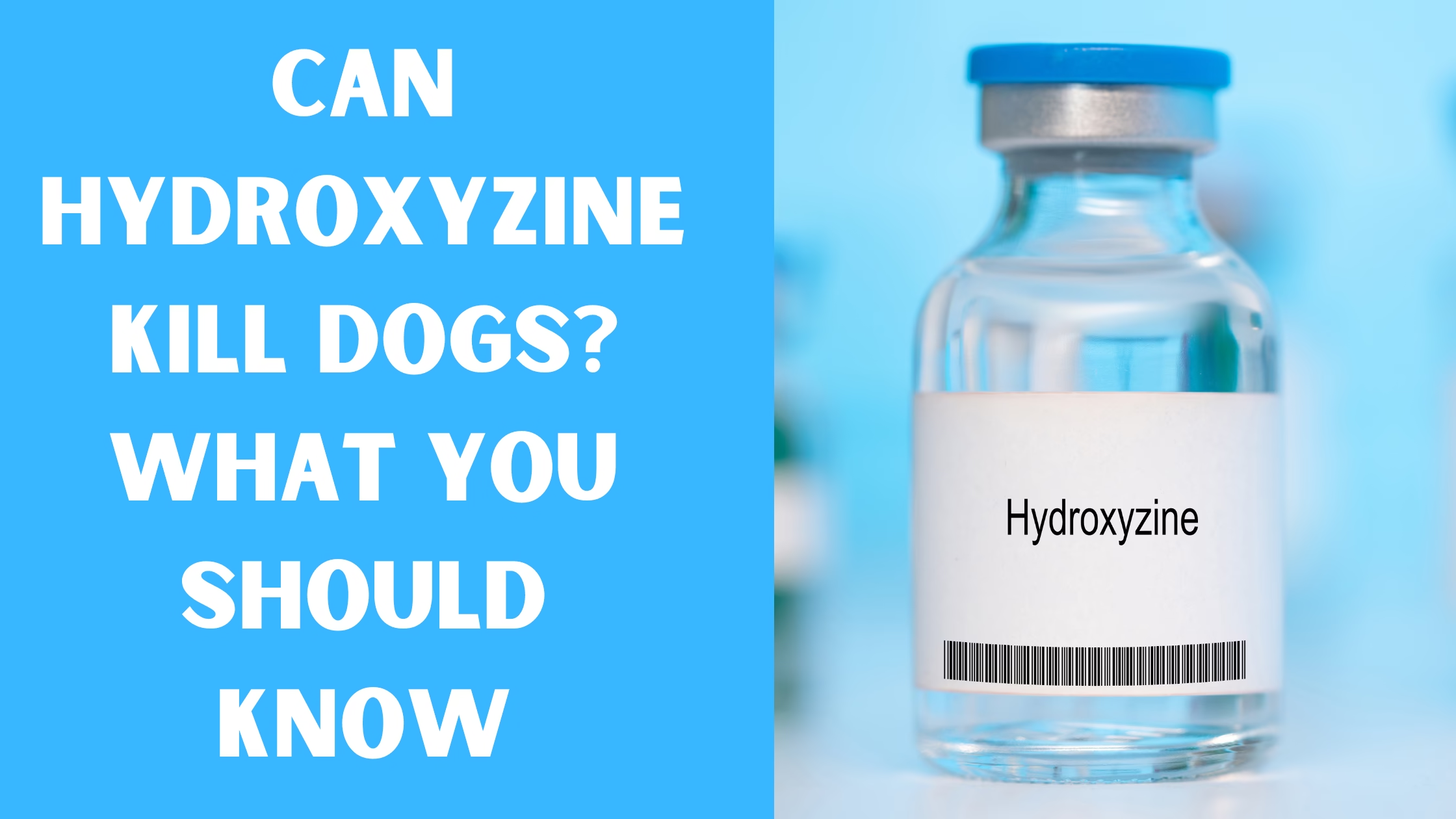Can Hydroxyzine Kill Dogs? Probably No. – Welcome to our article on hydroxyzine and its potential risks for dogs.
Hydroxyzine is a medication used in humans and animals to manage various conditions.
However, pet owners must be aware of the possible dangers of this medication when used on dogs.
By understanding the potential risks and taking appropriate precautions, we can ensure the well-being and safety of our furry friends.
In this article, we will explore the topic of hydroxyzine toxicity in dogs, addressing key questions and providing valuable information to help you make informed decisions about your dog’s health.
So, let’s delve into this critical subject and learn more about hydroxyzine and its potential effects on our canine companions.
Is hydroxyzine safe for dogs?

Hydroxyzine, when used appropriately and under the guidance of a veterinarian, can be safe for dogs.
It is a medication commonly prescribed to dogs for various conditions, such as allergies, itching, anxiety, and motion sickness.
However, it is crucial to emphasize that proper veterinary supervision is essential when administering hydroxyzine to your furry companion.
The safety of hydroxyzine lies in using it as prescribed by a veterinarian.
This means following the recommended dosage and duration of treatment specific to your dog’s condition.
Veterinarians consider the dog’s size, age, overall health, and any existing medical conditions before prescribing hydroxyzine.
It’s important to note that using hydroxyzine without veterinary guidance or exceeding the recommended dosage can harm your dog’s health.
A veterinarian will consider your dog’s needs and tailor the treatment plan to ensure safety and effectiveness.
Always consult your veterinarian before giving any medication to your dog, including hydroxyzine.
They will provide proper guidance, evaluate your dog’s specific situation, and determine the appropriate dosage and duration of treatment based on their professional expertise.
Remember, the safety of your furry friend should always be a top priority, and seeking veterinary advice is crucial when it comes to medication use.
Working closely with your veterinarian ensures hydroxyzine is used safely and effectively for your dog’s needs.
Also Read : Snickerdoodle Dog: Breed Information, and Best Care Guide
Hydroxyzine toxicity in dogs
A. Hydroxyzine poisoning and overdose
Hydroxyzine poisoning occurs when a dog ingests an excessive amount of the medication, either accidentally or intentionally.
An overdose happens when the dosage administered exceeds the recommended amount. Both situations can lead to adverse effects and potential toxicity.
It’s crucial to prevent accidental ingestion or overdosing of hydroxyzine in dogs.
Keep medications securely stored in a place inaccessible to pets, and never leave them within reach.
Accidental ingestion can occur when curious dogs find unattended medication bottles or improperly disposed of pills.
In case of suspected ingestion or overdose, immediate veterinary attention is necessary.
B. Factors influencing hydroxyzine toxicity in dogs
Several factors can influence a dog’s susceptibility to hydroxyzine toxicity. These include age, breed, size, and underlying health conditions.
1. Age: Young puppies and elderly dogs may be more sensitive to the effects of hydroxyzine. Their bodies may metabolize the medication differently, potentially increasing the risk of toxicity.
2. Breed: Certain breeds, including hydroxyzine, may be more sensitive to medications. It’s essential to be aware of any breed-specific sensitivities and discuss them with your veterinarian.
3. Size: Dogs of different sizes may require different dosages of hydroxyzine. Smaller dogs may be more susceptible to the effects of the medication, so it’s crucial to follow the recommended dosage based on your dog’s size.
4. Underlying health conditions: Dogs with pre-existing medical conditions, such as liver or kidney disease, may be at a higher risk of experiencing adverse effects or complications from hydroxyzine.
In such cases, a veterinarian will carefully consider the appropriate dosage and closely monitor the dog’s response.
Understanding these factors can help pet owners, and veterinarians make informed decisions regarding the use of hydroxyzine in dogs.
By considering these factors, veterinary professionals can tailor the treatment plan to minimize the risk of toxicity and ensure the dog’s well-being.
Always consult a veterinarian before administering hydroxyzine to your dog, and follow their instructions carefully.
Veterinary guidance is crucial in determining the appropriate dosage and monitoring your dog’s response to the medication, thereby minimizing the risk of hydroxyzine toxicity.
How much hydroxyzine is toxic to dogs?
Determining the exact dosage of hydroxyzine that is considered toxic to dogs can be challenging, as it can vary depending on individual factors.
A veterinarian should always determine the recommended dosage and toxicity threshold of hydroxyzine in dogs.
Generally, veterinarians prescribe hydroxyzine at specific dosages based on a dog’s weight, medical condition, and other relevant factors.
The typical dosage range for dogs is 0.5 to 1 mg per pound of body weight, administered orally two to three times a day.
However, it’s important to note that these are general guidelines and may vary depending on the specific circumstances.
The toxicity level of hydroxyzine can be influenced by various factors, including a dog’s overall health, age, breed, and any underlying medical conditions.
Certain dogs may be more sensitive to the medication and experience lower-dose adverse effects. In comparison, others may tolerate higher doses without complications.
To determine the appropriate dosage and ensure your dog’s safety, it is essential to consult with a veterinarian.
They will consider your dog’s individual characteristics, medical history, and the specific condition being treated to prescribe the most suitable hydroxyzine dosage.
Never attempt to determine the dosage or experiment with the medication on your own, as this can pose a risk to your dog’s health.
Only a veterinarian has the expertise to assess your dog’s needs and prescribe the appropriate hydroxyzine dosage.
Remember, the goal is to achieve the desired therapeutic effect while minimizing the risk of toxicity.
By working closely with your veterinarian and following their instructions, you can ensure your dog receives the correct hydroxyzine dosage, maximizing the benefits and minimizing potential risks.
Symptoms of hydroxyzine toxicity in dogs
When a dog experiences hydroxyzine toxicity, there are several common signs and symptoms to watch out for. These indicators can vary in severity and may include:
1. Sedation: Dogs may appear excessively tired, lethargic, or have difficulty staying awake. They may seem unresponsive or have a decreased awareness of their surroundings.
2. Lethargy: A dog affected by hydroxyzine toxicity may lack energy and enthusiasm. They may be less interested in activities or show decreased mobility.
3. Tremors: Uncontrolled shaking or trembling of the muscles can be a noticeable sign of hydroxyzine toxicity. Dogs may have tremors in their limbs, head, or entire body.
4. Rapid breathing: Increased respiratory rate, or tachypnea, can be observed in dogs experiencing hydroxyzine toxicity. This may be accompanied by shallow or labored breathing.
5. Changes in heart rate: Dogs may exhibit an irregular or rapid heartbeat (tachycardia) or a slower-than-normal heart rate (bradycardia) when affected by hydroxyzine toxicity.
It is important to remember that these symptoms can indicate a potential problem. Still, they are not exclusive to hydroxyzine toxicity.
Other underlying conditions or concurrent medications may also contribute to similar symptoms.
Suppose you notice any of these signs in your dog and suspect hydroxyzine toxicity. In that case, it is crucial to seek immediate veterinary attention.
If your dog displays signs of hydroxyzine toxicity, do not delay contacting your veterinarian or an emergency veterinary clinic.
They can assess your dog’s condition, perform necessary diagnostic tests, and provide the appropriate treatment.
Prompt veterinary intervention is essential to manage hydroxyzine toxicity and minimize potential complications effectively.
Remember, your veterinarian is the best resource for evaluating your dog’s symptoms and determining the appropriate action.
By being vigilant and proactive in seeking veterinary care, you can ensure the well-being and safety of your furry friend if hydroxyzine toxicity is suspected.
What to do if my dog has ingested hydroxyzine?
If you suspect your dog has ingested hydroxyzine, taking immediate action is essential to ensure their safety. Here are some steps to consider if the ingestion is recent:
1. Assess the situation: Determine the quantity of hydroxyzine your dog may have consumed and the timeframe of the ingestion. This information will be helpful when consulting with a veterinarian.
2. Contact a veterinarian: Reach out to your veterinarian immediately. Please describe the situation and provide them with all relevant details.
They will guide you on the next steps based on your dog’s size, weight, and hydroxyzine ingested.
3. Follow veterinary advice: Your veterinarian may recommend different courses of action depending on the specific circumstances.
They may advise you to induce vomiting, but only if it is deemed safe and effective for your dog’s condition.
Inducing vomiting should only be done under veterinary guidance, as it may not be appropriate in some instances.
4. Veterinary poison control helpline: If you cannot reach your veterinarian or need immediate assistance, consider contacting a veterinary poison control helpline.
They have professionals trained in handling cases of toxic ingestions and can provide guidance tailored to your dog’s situation.
Keep in mind that there may be a fee associated with their services.
5. Do not administer any treatments without veterinary guidance: It is essential to refrain from giving your dog any medications or treatments without consulting a veterinarian first.
Unsupervised administration of substances can lead to unintended consequences and may worsen the situation.
Remember, each case is unique, and the appropriate steps may vary based on individual factors.
By promptly contacting a veterinarian or a veterinary poison control helpline, you can ensure that your dog receives the necessary care and attention to address hydroxyzine ingestion.
Do not delay seeking professional guidance, as early intervention can significantly improve the outcome and help minimize any potential risks or complications.
Your veterinarian is the best resource for providing the appropriate advice and treatment recommendations for your dog’s needs.
Can hydroxyzine kill dogs?

Hydroxyzine, like any medication, can have potential risks and adverse effects if not used properly.
In cases of extreme overdose or when certain dogs have specific sensitivities, severe hydroxyzine toxicity can occur.
However, it’s important to note that fatal outcomes from hydroxyzine toxicity are rare when immediate veterinary care is sought.
Hydroxyzine is primarily used as an antihistamine and anxiolytic in veterinary medicine.
While it can be beneficial in managing specific conditions, it must be used under the guidance and supervision of a veterinarian.
They will determine the appropriate dosage based on your dog’s needs, considering size, weight, and medical history.
Extreme overdose or accidental ingestion of large amounts of hydroxyzine can lead to severe complications.
These may include profound sedation, respiratory depression, changes in blood pressure, and cardiac abnormalities.
However, it’s important to remember that such cases are relatively rare, especially when dogs receive timely veterinary attention.
Suppose you suspect your dog has ingested excessive hydroxyzine or is showing signs of severe toxicity.
In that case, it is crucial to seek immediate veterinary care.
Veterinarians have the knowledge and resources to manage these situations effectively and provide the necessary treatment.
Prompt veterinary intervention can significantly reduce the risk of severe consequences.
Remember, responsible medication use and prompt veterinary attention when needed is the key to ensuring your dog’s safety.
Following your veterinarian’s instructions and promptly seeking their guidance can minimize the risks associated with hydroxyzine use and protect your beloved canine companion.
While it’s essential to be aware of the potential risks, it’s also important to understand that fatal outcomes from hydroxyzine toxicity are rare when veterinary care is sought promptly.
Trust in the expertise of your veterinarian, as they are best equipped to evaluate your dog’s condition and provide appropriate care.
Also Read : Why Your Dog Threw Up Yellow Liquid and Died – Best Guide
Conclusion
In conclusion, responsible use and veterinary guidance are crucial when it comes to using hydroxyzine in dogs.
While hydroxyzine can be beneficial in managing specific conditions, it’s essential to follow your veterinarian’s instructions and only administer the medication as prescribed.
Hydroxyzine toxicity can occur in cases of extreme overdose or dogs with specific sensitivities.
However, it’s important to remember that fatal outcomes from hydroxyzine toxicity are rare when immediate veterinary care is sought.
Suppose you suspect that your dog has ingested an excessive amount of hydroxyzine or is experiencing severe symptoms. In that case, it’s vital to seek immediate veterinary attention.
Remember, your veterinarian is the best source of guidance regarding medication use in your dog.
They will determine the appropriate dosage based on your dog’s specific needs and provide instructions for proper administration.
If you have any concerns or suspect hydroxyzine toxicity in your pet, do not hesitate to contact your veterinarian for advice and assistance.
By using hydroxyzine responsibly and seeking veterinary guidance, you can minimize the potential risks and ensure the well-being of your furry friend.
Let’s prioritize our dogs’ health and safety by working with our trusted veterinarians and reporting any suspected cases of hydroxyzine toxicity.
Always remember that the well-being of our beloved pets is a collective effort, and your veterinarian is there to provide the expertise and care needed to keep them happy and healthy.







